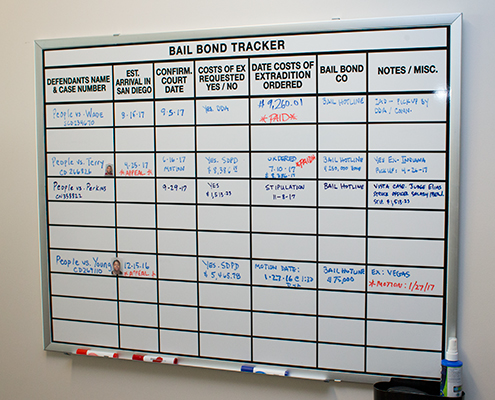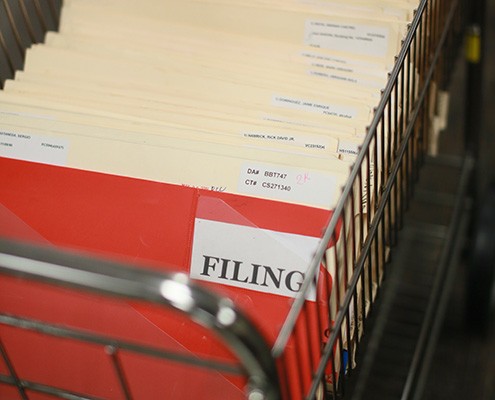| 2017 Staffing | |
|---|---|
| Attorneys | 10 |
| Investigators | 0 |
| Paralegals | 4 |
| Support Staff | 20 |
| Interns | 1 |
| Student Workers | 1 |
| Total | 36 |
The Case Issuance and Extradition Division is responsible for reviewing cases for potential criminal charges, coordinating domestic and international extraditions and overseeing a number of units involving clemency, prior criminal conduct and more. The division was managed in 2017 by Deputy District Attorneys Susan Gust, the division chief and Nida Rice the assistant chief. Legal Support Manager Ella Bookwalter and Paralegal Supervisor Debbie Kamin assisted the chiefs. The division is comprised of the following units:

- Felony Issuing
- Priors
- Domestic and International Extraditions
- Proposition 57
- Certificates of Rehabilitation and Clemency
- DA Liaison
Felony Issuing
This unit reviews police reports submitted by various law enforcement agencies requesting criminal charges for offenses occurring primarily in central San Diego. Case Issuance attorneys evaluate cases for criminal prosecution based on the facts and the evidence with an issuing standard of “proof beyond a reasonable doubt.” Depending on the circumstances of the matter, they may refer cases for vertical prosecution by a specialized unit within the District Attorney’s Office, or to another prosecuting agency for their evaluation. The Case Issuance staff works closely with the San Diego City Attorney’s Office to ensure offenses committed within the city limits are appropriately prosecuted as felonies or misdemeanors. In 2017, the attorneys in this division reviewed 3,501 felony cases for issuing. Felony charges were filed against 2,392 defendants. Charges for 474 defendants were rejected and another 635 defendants were redirected to other prosecuting agencies. All of these cases were processed by the Case Issuance clerical staff, including cases referred to specialized units within our office. The attorneys in the division also addressed a variety of legal issues and provided legal advice on criminal law, procedure and evidence to the various law enforcement investigators who submit cases to our office for consideration.
Priors Unit
The Priors Unit obtains certified copies of court documents for use in pending cases or to evaluate potential criminal charges. These can be prior convictions, prison packets, court orders, minute entries, restraining orders or other documentary evidence needed for the case being prosecuted or evaluated. Prior convictions can elevate criminal conduct to the felony level, provide specific requirements for sentencing, or elevate a defendant’s custody exposure allowing defendants with criminal records to be given a commensurate sentence. Documents are obtained from courts throughout San Diego County and from other jurisdictions. Additionally, this unit assists the California Department of Corrections and Rehabilitation, the California Department of Justice, as well as other agencies and jurisdictions with inquiries related to case dispositions within the county.
CODIS DNA Hit/DA Case Management System Integration Project
The Combined DNA Index System (CODIS)/DA Case Management System Integration Project is a grant-funded program that pairs one assigned Deputy District Attorney to work collaboratively with the crime labs of the San Diego Police and Sheriff’s Departments. This important project uses technology to track the scientific results generated by these laboratories to achieve a greater measure of justice for San Diego victims of previously unsolved crimes. At the onset of the project, the DA Information Technology Division modified our case management system to be able to electronically import CODIS matches or “hits” directly from the two crime labs. The case management system continues to receive downloads of all new CODIS hits on a bi-weekly basis. This technology allows our office to effectively manage and track the voluminous DNA data results from unsolved crimes. It also gives prosecutors real-time information about open CODIS hits related to defendants they have previously or are currently prosecuting. As a direct result of this collaborative project with the crime labs and law enforcement, felons who had pending felony cases have been tied to older, unsolved crimes. To date, our office has input over 7,942 hits into our database.
eDiscovery
The District Attorney’s Office continues to use and improve its eDiscovery program. In 2017, about 5.5 million pages of discovery (police reports and other documentary evidence) were scanned into an electronic format. More than 1,583 private attorneys, as well as all of the attorneys in the Office of the Public Defender and Office of the Alternate Public Defender, receive discovery via eDiscovery in adult criminal matters. This allows discovery to be provided in a cost effective and timely manner. Our program serves as a model for other District Attorney’s Offices in the state.
Domestic and International Extraditions
Domestic: The Extradition Unit initiated legal proceedings to bring 103 defendants in other states back to San Diego to address pending criminal matters in 2017. Extradition prosecutors also filed fugitive complaints against 51 fugitives apprehended in San Diego, who were then sent back to the states requesting extradition.
International: Four serious and violent offenders were extradited from Mexico including three defendants facing murder charges and one defendant charged with child molestation. To date, the unit has extradited 34 international fugitives, all serious and violent offenders, from Mexico, Canada, Panama and Belgium. Currently, one fugitive is in federal custody in Mexico pending extradition. In 2017, we prepared and submitted 10 Provisional Arrest Warrant/Formal Extradition requests to Mexico, Guatemala and India.
Bail Bond Cases and Extradition
When a defendant, who is out of custody on bail, flees the jurisdiction, Penal Code Section 1306(b) provides that the bond company reimburse the costs associated with extraditing a defendant back to San Diego before the bond is exonerated. In 2017, the San Diego District Attorney’s Office pursued and received orders for reimbursement in approximately 35 cases, for a total amount ordered of approximately $153,195. This is a $19,000 increase from 2016. These reimbursement funds were distributed directly to the agencies that expended resources to complete the extradition, including the San Diego District Attorney’s Office, the San Diego Sherriff’s Office and the San Diego Police Department.
Proposition 57
This proposition was enacted by the voters in November 2016 and implemented by the California Department of Corrections and Rehabilitation in July 2017. Proposition 57 provides a mechanism for current inmates who are convicted of non-violent crimes, as defined by PC667.5(c), to receive a ‘Review on the Merits’ to determine their suitability for early release, on parole. The District Attorney’s Office analyzes the inmate’s current convictions and criminal history, reaches out to victims for input, and determines whether or not to submit an opposition to early release on parole to the Board of Parole Hearings.
Certificates of Rehabilitation and Clemency
In general, anyone convicted of a felony crime or misdemeanor sex crime can later petition the court for a Certificate of Rehabilitation. If the person establishes that they have led an honest and crime free life, among other criteria, since their conviction, the court will grant the certificate. This is a step toward obtaining a gubernatorial pardon. In 2017, our office processed 29 Certificates of Rehabilitation. Additionally, this unit responds to notices of applications for Clemency submitted to the Governor’s Office for consideration. Clemency can be in the form of a traditional pardon or commutation of sentence. During 2017, we reviewed 107 applications for clemency.
DA Liaison Unit
Two experienced prosecutors are assigned as liaisons to local and state law enforcement agencies. The liaisons work closely with law enforcement to assist them in assuring evidence is collected lawfully so it can be introduced in court. The prosecutors help police draft legal documents, such as search warrants, arrest warrants, and other court orders. The DA liaisons are available seven days a week, 24 hours a day, to answer legal questions. In 2017, the two liaisons reviewed more than 1,430 search and arrest warrants. They also provided legal advice on numerous inquiries from law enforcement and prosecutors, and conducted multiple law enforcement trainings and classes on topics including search and seizure, the 5th and 6th Amendments, and updating officers on significant changes in the law.





